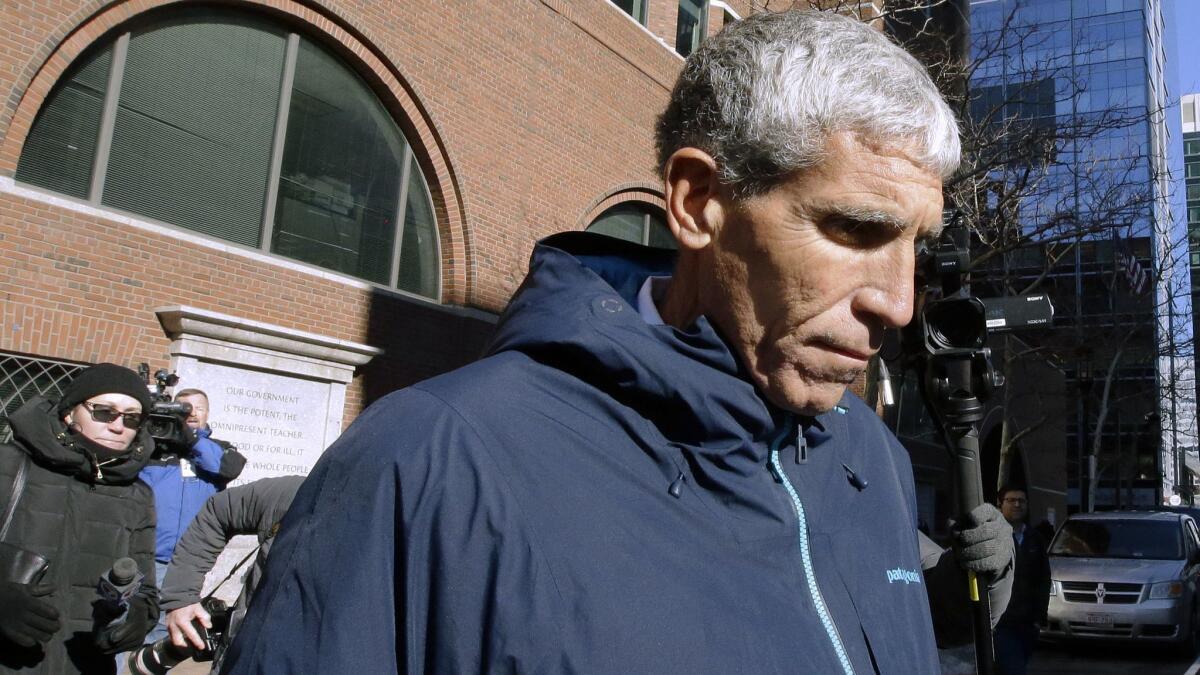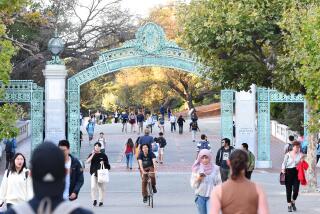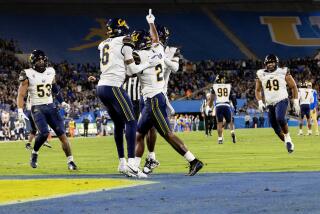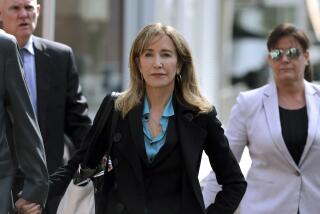Must Reads: Mediocre grades? Weak SATs? Rick Singer got you into an elite college — for a price

The self-styled “master coach” warned parents that in the scramble for a spot at an elite university, their children would hardly stand out without his help. He spoke of a “side door” to top schools he could wrench open to the “wealthiest families in the U.S.”
William “Rick” Singer made his name — and, prosecutors say, a fraudulent fortune — by peddling a bleak view of the college admissions process, one he portrayed as a minefield where one “small oversight or mistake … can make all the difference in your son or daughter gaining admission to the school of their dreams,” as he wrote on the book jacket of his guide to applying to college.
Now, the Newport Beach businessman stands at the heart of a scandal that has ensnared Hollywood actresses, chief executives and a fashion designer — what U.S. Atty. Andrew E. Lelling called “a catalog of wealth and privilege” — along with coaches and officials at some of the country’s preeminent schools.
Singer, 58, pleaded guilty this week to charges of fraud, racketeering, money laundering and obstruction of justice.
Using a charity registered at his six-bathroom, $1.5-million Newport Beach home, Singer was paid more than $25 million by parents who, believing their children lacked the grades and test scores to get into elite universities, turned to a reputed “college whisperer” who bragged of shuttling hundreds of students into top universities, according to prosecutors.
The charity said in tax documents that it helped underserved Oakland schoolchildren and “needy Cambodians.” Prosecutors allege the nonprofit was actually a sham Singer used to launder money and funnel bribes to coaches and university officials who passed off applicants who didn’t play sports as recruited athletes. Current and former coaches at Yale, USC, UCLA, Stanford and other top schools have been charged with fraud and conspiracy.
Singer admitted charging $15,000 to $75,000 to rig tests for children in his con he called the “home run of home runs.”
“I don’t know how my Rick Singer became your Rick Singer,” said Ron McKenna, a friend of more than three decades. “It just boggles my mind to think that he’s been the engineer of all of these things.”
UCLA men’s soccer coach placed on leave after indictment in college admissions scam »
Born in Santa Monica in 1960, Singer attended community college in Texas before transferring to Trinity University in San Antonio, where he graduated with a bachelor’s degree in English and physical education in 1986.
Three years later, he married his now-ex-wife, Allison, in Corona del Mar, according to court records.
By then, he was coaching basketball in Sacramento County.
John Meckfessel was a freshman playing at Encina High School in 1987 when Singer was coaching.
“He put all of his blood, sweat and tears into it,” Meckfessel said. “He was there sweeping down the floor before practice to make sure that the gym was ready.”
Meckfessel said Singer was fired after only a year. “I think his intense passion was a bit over the top for some,” he said. “But some of us loved him.”
McKenna, Singer’s longtime friend, said they met while both worked as assistant basketball coaches at Cal State Sacramento from 1989 to 1992. McKenna said he was surprised that Singer, a skilled coach, left basketball for other ventures. As Singer grew his college admissions business, McKenna said, he would share details of his latest visits to campuses around the country.
“I only knew the honest side of the business. He played it pretty close to the vest,” McKenna said.
If his website is to be believed, Singer amassed a college preparation empire called the Key, with footholds in 81 U.S. cities and five foreign countries. At least a decade ago, his website said, he left the business to lead several call center companies, including one in India, before returning to the Key to develop an online high school curriculum.
One of his college counseling ventures, the CollegeSource, boasted “an impressive advisory board that includes the president emeritus of Stanford and the director of the Carnegie Foundation,” the Sacramento Business Journal reported in 2005.
USC fires administrator and coach arrested in college admissions fraud scheme »
Ted Mitchell, a former president of Occidental College and member of the advisory board, was quoted saying Singer was “really great at getting at the heart of what kids and families want — and finding the right match.”
Mitchell, who was undersecretary of the U.S. Department of Education from 2014 to 2017 and is now president of the American Council on Education, said through a spokesman that he served without pay as an advisor in one of Singer’s ventures 15 years ago and is “shocked, sad and angry that someone I thought I knew could perpetrate these crimes.”
By 2011, Singer and his wife had separated. The couple’s divorce filings hardly portrayed them as poor — but nowhere near as rich as this week’s federal court records paint Singer.
When they split, Singer’s monthly income from his businesses was more than $30,500. While the couple had homes in Sacramento and Hawaii and several retirement accounts worth more than $700,000, records show they had tax liabilities of $162,000.
By the time he pleaded guilty in a Boston courtroom Tuesday, Singer appeared to be considerably wealthier. He agreed to forfeit his charity’s investments in Swansea City Football Club, a chain of fast-casual Mexican restaurants, a Texas data company, a Santa Monica private equity fund and an Oakland basketball facility. He will also give up two bank accounts held by the charity and pay a $3.4-million forfeiture judgment.
Since 2011, federal authorities said, Singer had directed clients to make tax-deductible donations to his charity, Key Worldwide Foundation, which Singer used to funnel bribes to college coaches and others involved in the scheme.
One Bay Area couple gave the charity 2,150 shares in Facebook and donated to UCLA before writing off more than $1 million in charitable gifts on their taxes, according to a court filing. Singer helped their daughter land a spot at UCLA. The couple were among those indicted.
Singer was hardly shy about his work.
Federal court records cite a phone call last summer in which Singer explained his scam of recruiting student athletes to Gordon Caplan, co-chairman of the law firm Willkie Farr & Gallagher.
“There is a front door, which means you get in on your own…. I’ve created this side door,” Singer said.
Full coverage: Dozens charged in college admissions fraud scheme »
He became known as a rainmaker. When marketing guru Jane Buckingham worried that her son was too sick to travel to one of Singer’s appointed test centers in Houston, Singer arranged to have a test sent to him so that he could take it at home, according to federal records.
Meanwhile, Buckingham’s son would have no idea Singer was paying someone else to take the test for him.
“I know this is craziness, I know it is,” a grateful Buckingham told him. “And then I need you to get him into USC, and then I need you to cure cancer and [make peace] in the Middle East.”
Buckingham and Caplan were among those charged this week.
Singer began cooperating with the government in September 2018 and wore a wire, prosecutors said. But he soon tipped off several people about the investigation, according to court filings. For that, he has pleaded guilty to obstructing justice.
Months before he began cooperating, investigators listened as Singer tried to reassure Caplan about his plan to have someone else take a test for the lawyer’s daughter, according to court records.
“If somebody catches this, what happens?” Caplan asked.
“The only one who can catch it is if you guys tell somebody,” Singer responded.
“I am not going to tell anybody,” Caplan said.
Singer, laughing, replied, “Neither am I.”
More to Read
Start your day right
Sign up for Essential California for news, features and recommendations from the L.A. Times and beyond in your inbox six days a week.
You may occasionally receive promotional content from the Los Angeles Times.








